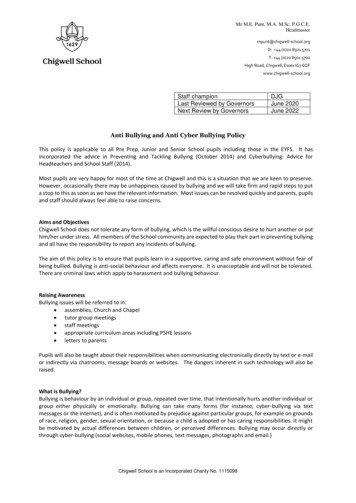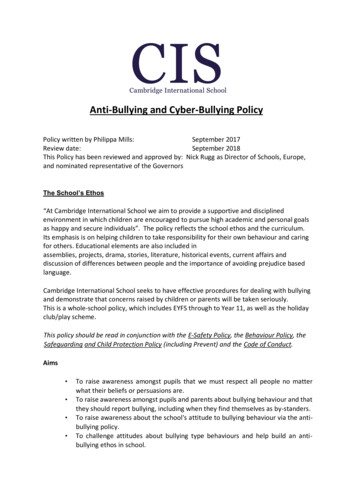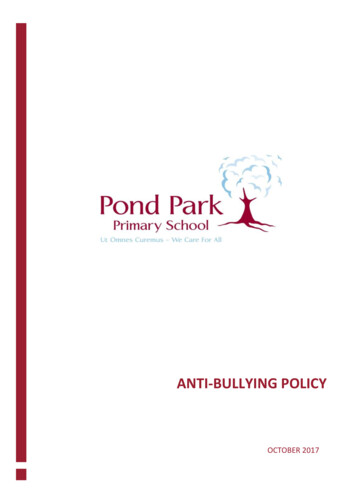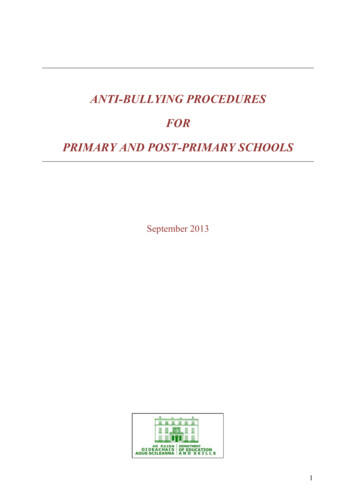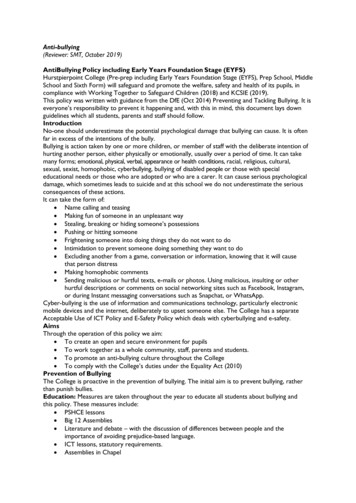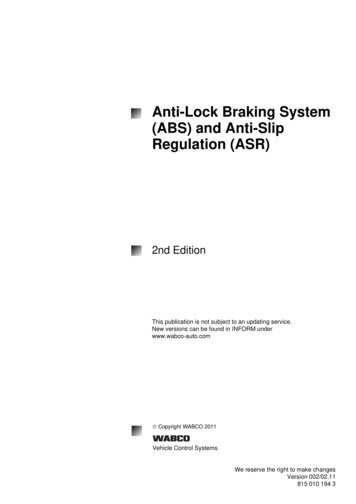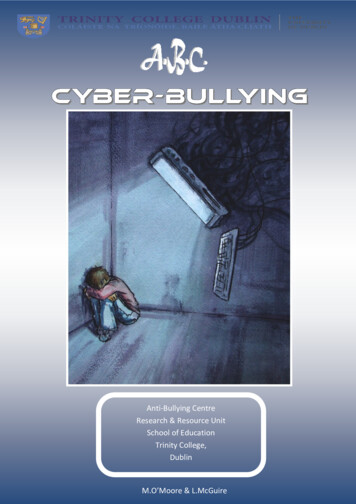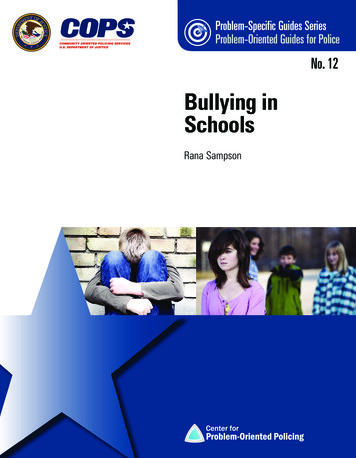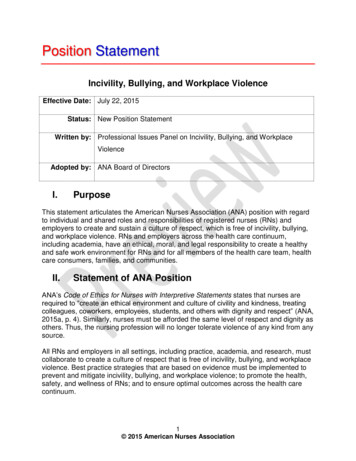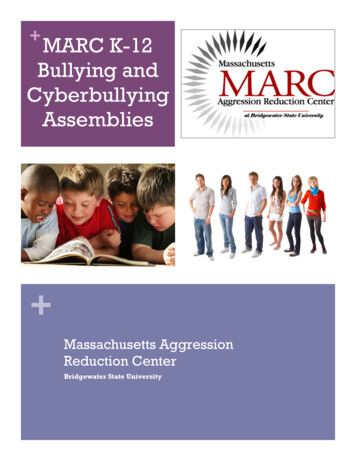
Transcription
ANTI-BULLYING POLICYFORST. MALACHY’S P.S.AND NURSERY UNITCAMLOUGHMISSION c
St. Malachy’s promotes the Catholic ethos in all aspects of the schoolcommunity while educating the whole child in a caring atmosphere.Great value is placed on the individuality of each child as we nurture anddevelop his or her needs.This school offers a broad and balanced curriculum within a stimulatinglearning environment and encourages all pupils to strive towardsexcellence.We foster good relationships within the school and extend them todevelop strong links with the wider community.DEFINITION OF BULLYINGC:\Users\Nicki\Downloads\Anti-bullying.doc
Bullying is deliberately hurtful behaviour which causes pain, discomfortand embarrassment to those who find it difficult to defend themselves.Pupils may be targeted on the basis of race, disability, religion, cultureand gender. Pupils may also be targets of homophobic bullying includingperceived sexual orientation or identity. It involves an abuse of powerand is usually repeated over a period of time. It occurs as one of ittingname callingteasingswearingbitingstealingtelling liesaboutsomeoneVERBALbeing sarcasticthreateningmocking another’sabilities orachievementsexcluding from playpulling facesspreading rumoursEMOTIONALhate information onwebsitesnasty responses in webbased chat roomswriting nasty thingsignoring someoneirritating someoneCYBERnasty text and instantmessagesthreatening emailsThe aim ofpicture/video-clipour anti-bullyingpolicy is to help provide a happy, securebullyingenvironmentallphoneso thateveryone may achieve their full potential.via ying.doc
All members of the school community have a responsibility to protect andmaintain this desired environment. The school is opposed to anti-socialbehaviour of any kind, therefore bullying will not be tolerated.Our anti-bullying policy was formulated in collaboration with all staff,parents, pupils and EA personnel. It reflects the Catholic ethos of ourschool and follows the detailed guidance set out in Department ofEducation circulars 2017/04 (updated Sept 2019), 2003/13 (article 19)and 2007/01, Department of Education publication ‘Pastoral Care inschools: Promoting Positive Behaviour and guidance issued by the EA.This policy is only one of a number of our Pastoral Care policies (ChildProtection, Pastoral Care and Behaviour Management) each of whichcontain advice and guidance on helping staff discharge their primaryresponsibility for the care, welfare and safety of the pupils in our charge.The school will where necessary invoke the school’s Child SafeguardingProcedures.STAFF WILL: Promote self esteem and respect for others among their pupilsthus helping to make them responsible c
Discuss, with all pupils, the dangers of bullying so that they areaware of the damage it may cause and how to deal with it. Be prepared to listen to expression of feelings of pupils and bealert to symptoms of distress/bullying (see list). Send home annually information and guidance on bullying toboth parents and children. Provide, free of charge, copies of the school’s Anti-bullyingpolicy to all parents. Display posters containing guidance on what to do if someone isbeing bullied, including useful and relevant contact names andtelephone numbers. Work with and through the student council to build a bully freeschool environment.PUPILS WILL: Adhere to school rules thus maintaining a high standard ofdiscipline in and around the school. Report any concerns about the bullying of themselves or othersto a member of staff.PARENTS WILL: Watch for signs of unusual behaviour in their children, whichmight denote bullying. Support the school by reinforcing good behaviour at home (see‘Good Behaviour’ CCMS/EA). Liaise with the school as soon as they are aware of a bullyingbehaviour concern. Co-operate with the school by being supportive to their childrenand by reinforcing the implications of bullying.SIGNS OF BULLYING BEHAVIOURThe following signs may indicate that a pupil is being bullied at school.It is important to look for changes in behaviour patterns rather than jumpto conclusions i.e. a child suddenly becomes badly behaved.C:\Users\Nicki\Downloads\Anti-bullying.doc
Behavioural: unwilling to come to school and/or avoids particular days or lessons; reluctant to travel on school bus; frightened of walking to or from school or continually changes route toschool; comes to school late, leaves school late; avoids friends and others; performs poorly in class work; poor concentration/ inattentive; constantly loses possessions e.g. money, books, equipment etc.; refuses to tell what’s wrong; poor social skills; avoiding going out at play-time or else staying close to an adultsupervisor;Physical: has damaged clothing or belongings;socially isolated;has mystery illnesses;feels sick in class frequently;has physical injuries which they are reluctant to explain;Emotional: anxious, insecure;shy, sensitive;becomes emotionally volatile;unhappy, tearful;angry, aggressive, irritable;withdrawn;loses confidence;bursts into tears in class;becomes depressed;has low self-esteem;bed wetting;clingy;easily bullying.doc
sleeplessness/nightmares;regarded as a swot;attention seeking;eating disorders;skin irritations;compulsive/obsessive behaviour;self-inflicted injuries;suicidal.POSSIBLE CHARACTERISTICS OF A CHILD WHOIS DISPLAYING BULLYING BEHAVIOUR1Wanting own way2Aggressive/wielding power/‘leader of the pack’C:\Users\Nicki\Downloads\Anti-bullying.doc
3Pursuing pleasure without regard to how it may affect others4Lack of empathy5Lack of sympathy6Selfish7Has experienced bullying behaviour in the past8Lack of self confidence9Poor social skills10Devious, a skilled manipulator11Wanting to be popular/be part of the gangPREVENTATIVE MEASURES TO COMBATBULLYING BEHAVIOURCIRCLE TIME: a whole class activity which can be used to addressissues associated with bullying behaviour both before and when instanceshave arisen.C:\Users\Nicki\Downloads\Anti-bullying.doc
ALIVE-O/GROW IN LOVE: the religious education programme whichis taught throughout the school and contains lessons specifically fordealing with bullying behaviour, working out solutions for it anddiscussing its possible outcomes (Little beings).A RIGHTS RESPECTING SCRIPT (appendix no 1)ONE-TO-ONE INTERVIEW INTERVENTIONS - includingRestorative Questioning (appendix no 2)Think Time Discussion Sheet (appendix no 3)ESTEEMING THE PUPILS: a policy of positive marking is employedthroughout the school as one of the many ways in which to foster the selfconfidence of pupils. A ‘Student of the Week’ award is given to twopupils in each class each week, an achievement which is displayedthroughout the school. These awards are not necessarily for academicachievement, but are designed to make pupils feel valued. Three‘Headmaster’s’ awards are also awarded in each class each week forhomework, therefore promoting very valuable home/school liaison.CASE PROGRAMME: Pupils will attend workshops on CyberBullying delivered by CASE personnel.Anti-Bullying Week: Principal teaches a series of lessons on ananti-bullying theme throughout the school to coincide with AntiBullying Week. Staff deliver assemblies with anti-bullyingthemes.PROCEDURES FOR REPORTING INCIDENTS OFBULLYING BEHAVIOURAll members of the school community will be made aware of proceduresfor reporting incidents of bullying behaviour.It must be clear to all, but especially to children, through clearlydisplayed posters, distribution of leaflets, discussion, curricular work etc.whom to go to when reporting a bullying c
The following procedures should be adhered to: Provide a secure and appropriate environment in which the bulliedpupil and the child who is displaying bullying behaviour can reportincidents confidentially. If a pupil or parent confides in someone other than the designatedteacher the matter must be referred on to him. The designated teacherfor dealing with all incidents of bullying is the Principal. The bulliedpupil will usually confide in someone s/he trusts. S/he may, if s/he sowishes, have this person present for support. Listen to the story. Do not make judgements or 'put words into themouths' of either the bullied pupil or the child who is displayingbullying behaviour. Start to complete a Bullying Incident Report form (appendix no.4) assoon as the incident is reported. The school is also recording bullyingincidents into SIMS. (Records of all meetings where bullying isalleged will be kept until the pupil is at least 21 years old). Reassure by explaining the support which will be provided to the childwho has been bullied and the child who is displaying bullyingbehaviour and agree how the incident will be dealt with. Do not use the term 'bullied', 'bullying' or 'bully' to either party. Protect and support all parties while the issues are being resolved. Contact parents to review outcome (appendix no. 5)When a bullying incident is reported, remember: Each case will be different and the solution should be tailored to suitthe problem; To remain impartial - do not look to attribute blame; Aim to help both the child who is displaying bullying behaviour andthe child who has been bullied gain insight into their oc
With them consider ways of avoiding or resolving the difficulties theyare experiencing and/or presenting; Behaviours presented by the child who is displaying bullyingbehaviour and in some cases the child who has been bullied, willusually have been acquired as a result of their unique life experience.These are learned behaviours. With appropriate support they can bechallenged and replaced by acceptable behaviours. 'Naming and shaming' bullies is not recommended as it usually drivesbullying behaviour underground and can lead to a cycle of punishmentand control.RESPONDING TO ALLEGED BULLYING BEHAVIOUR We will assess and plan appropriate interventions with reference tothe school’s Positive Behaviour Policy and NIABF InterventionsFramework and Guidance DocumentWe may obtain advice, support or make a referral to a relevantsupport service eg. Behaviour Management Team, EWO,Education Psychology, Pupil Personal Development Team, ChildProtection Support ServicesWe will continue to monitor and support all pupils involvedC:\Users\Nicki\Downloads\Anti-bullying.doc
PROCEDURES FOR DEALING WITH INCIDENTSOF BULLYING BEHAVIOUR:THE SUPPORT GROUP METHODStep 1 - Interview the child who has been bullied to establish if bullyinghas taken place. Record Interview;Step 2 - Convene a meeting with those involved;Step 3 - Explain the problem;Step 4 – Promote a shared responsibility;Step 5 – Ask for ideas;Step 6 – Leave it up to them;Step 7 - Review the situation.It is school policy to inform immediately all relevant staff of anybullying incidents. If a bullying incident is proven, parents/carers ofthe child who has been bullied and the child who is displayingbullying behaviour will be contacted and the parents/carers may beasked to meet with the Principal.NURSERYIn the Nursery Unit any issues of concern should be raised with MrsMagee, Nursery Leader.Strategies for dealing with bullying type behaviour:Step 1 - Withdraw child from activity, move to a quiet room and showchild this type of behaviour is not acceptableStep 2 - Inform PrincipalStep 3 - Inform ParentsC:\Users\Nicki\Downloads\Anti-bullying.doc
Step 4 - If necessary invoke Child Protection Procedures.Appendix 1C:\Users\Nicki\Downloads\Anti-bullying.doc
C:\Users\Nicki\Downloads\Anti-bullying.doc
Appendix 2Appendix 3C:\Users\Nicki\Downloads\Anti-bullying.doc
Appendix 4C:\Users\Nicki\Downloads\Anti-bullying.doc
C:\Users\Nicki\Downloads\Anti-bullying.doc
C:\Users\Nicki\Downloads\Anti-bullying.doc
C:\Users\Nicki\Downloads\Anti-bullying.doc
C:\Users\Nicki\Downloads\Anti-bullying.doc
C:\Users\Nicki\Downloads\Anti-bullying.doc
Appendix 5C:\Users\Nicki\Downloads\Anti-bullying.doc
ST. MALACHY’S PRIMARY SCHOOLAnd nursery unitPrincipal:Mr J Kearns3 Chapel Road, Camlough, Newry, Co DownTel: 02830 830559Fax: 02830 839135B.Ed(Hons) M.A. Educ ManPQH(NI)Date:Dear ParentIncident betweenPlease sign below if you are happy with the way in which the school dealtwith your concerns regarding the above incident. If you still haveconcerns please do not hesitate to contact me.Thank youJim KearnsPrincipalI am happy with the way the school handled my concerns and the matterhas been resolved.Signed:Date:Monitoring and EvaluationThe Anti-Bullying Team in St Malachy’s Primary school will update thispolicy and procedures in the light of any further guidance and legislationas necessary and review it c
On-going evaluation will ensure the effectiveness of the policy.Date policy reviewed: 23/10/2017Signed:(Principal)(Chair of Board of oc
CASE PROGRAMME: Pupils will attend workshops on Cyber Bullying delivered by CASE personnel. Anti-Bullying Week: Principal teaches a series of lessons on an anti-bullying theme throughout the school to coincide with Anti-Bullying Week. Staff deliver assemblies with anti-bullying themes. PROCEDURES FOR R
